#story theory
Text
So I just finished re-watching Misfits and Magic, and I know a lot of people talk about how it's kind of sad that Jammer and Sam don't really have arcs like K and Evan. . . I have thoughts about that.
In modern Western cinema, we expect protagonists to have an arc, where they change, grow, learn things and are different people from the beginning of the story to the end. This is most common in movies, and then books.
But the thing is we also have a type of protagonist that's more common in TV shows, where the character stays mostly the same, and by doing so they affect the world around them or bring out interesting themes and call out issues in the world, just by being themselves. (Think the crew of the Enterprise in Star Trek TNG.)
Misfits and Magic has BOTH of these kinds of characters. K and Evan are movie protagonists. Jammer and Sam are TV show protagonists. And I love that they coexist and both make each other's types of stories stronger.
This time around, I really appreciated the constancy of Sam and Jammer, the way they don't really change, but seem to grow more solidly into who they already were at the beginning of the show. They expose the foibles of the world by having the world brush against THEM. They change the world and the characters around them, by staying true to who they are.
K and Evan change the world because they are changing themselves.
Both kinds of stories are valid, and both kinds of stories are needed.
#dimension 20#dimension 20 spoilers#misfits and magic#d20 mismag#k tanaka#whitney jammer#sam black#evan kelmp#protagonist#film vs tv#storytelling#story theory
93 notes
·
View notes
Text
"You shouldn't put _this trigger_ in fiction *at all*" Censor before publishing discourse.
So, People of Color people aren't allowed to write about racism?
Women aren't allowed to talk about sexual assault, feminism?
Victims of r* aren't allowed to talk about it from their PoV and should leave it to people who've never, ever gone through it?
Men can't talk about how they too have gone through it and sort it in a social justice way and talk about the patriarchy is a way that goes deeper than the basic white feminism of Barbie?
People who know what *abuse actually feels like and would like to advocate against it* aren't allowed to talk about abuse?
When people talk about sex in YA, often the discourse isn't about writing safer sex and consent at all, but "should you write about sex with teens"
But this creates severe issues.
Look, I as one of the fundamentally token red shirts on this planet, queer, PoC, NB not a woman, but often have to fake it for the doctor's office because they won't let me check off NB and give me the form for that, with a history of abuse, history of institutionalization, want to fucking transform my shitty crap into diamonds by transforming my trauma into social justice awareness.
When you say, but you shouldn't write it into books at all, that means you silence the people who have gone through it, and need to talk about it, and wish to make the world a better place.
And sometimes the veneer of fiction is what people need in order to do that.
The reason, as many, many Science Fiction, Fantasy, and Horror authors have said their genre is one of the best ass places for talking about social issues is because of that ability to create distance from the issue and then dissect the hell out of it. This way it's not because I am left and live in this country... tory, whig, democrat, etc. It's these are the issues at stake, this is how it actually feels as this person going through this thing. This is why you exactly shouldn't do it, because it fucks with your head exactly this way long term.
But if you start labeling the issue in an exact way with the modern/contemporary terms from our world, people will start flipping out, but fiction gives the author super powers to say, this is what transformation of this AWFUL TERRIBLE thing looks like. And maybe this is why it's hard and this is how to do it.
Fiction can divide things into questions.
Instead of the discourse being, should teens have sex *in fiction*. I think the discourse should be, why aren't more writers writing like Norma Klein who was absolutely frank about birth control methods, what consent and safer sex was, and the results of (for her time period) a sexually abusive person that didn't get to go to jail, and marry his teen victim. And instead the reviews of her book are... OMG, she's soooo frank about sex I'm blushing.
Nyahh, you should read her because she's frank about sex, she's doing anti-body shaming initiatives, spends a fair amount of time comparing television to reality, talking about pubic hair as a natural thing, and combating TV images, and the "perfect" body through talking about sex. Maybe more romance could do that?
This guy doesn't have the 10 inch scholong all night long. But is kind, caring, knows what else to do in the interim during his refractory period? Did Norma Klein do that? Absolutely. She talked frankly about sex in order to push sex education. I got things in her 1960's written book that my sex education teachers failed to teach me, like anti-body shaming. Pubic hair is natural. (Romance is far, far from reality, I get that, but still... if you're going to blush at the word penis and think you can't possibly use it in a romance book in a frank discussion, then maybe you should reevaluate a bit. And I do wish Romance books went over consent too and made consent super sexy by having those frank consent discussion and making it oohhh I can't wait until we get through this discussion to *try* that, but we have to wait and oh my god, I didn't know that about you, I'm glad I get to *try* that. Make consent sexy. Make BDSM negotiations sexy. Make the how, "Would you like that?" OMG yes. sexy.).
The fact an ace is writing this about consent, safer sex and trying to ask people to not do body shaming isn't lost on me. But seriously. Also, I'm not sex repulsed, just on the indifferent scale. And aces can be sex positive.
Maybe in order to get queer joy, you need a bit of trauma up front so people know what the issues are. Maybe to get social justice in this area, you need to be able to talk about what people have to think about in order to go through transition and why people might opt out of it and how that too can be queer joy.
In order to transform the shit of the world, people should censor shit like happy slave gets with their master. YES. That probably should not be shared. Write it, keep it to yourself. OMG Nazis were good actually. Write it, don't share it with the general public.
But for the gnarly, for the honestly tricky, for the things that could be made into social justice, let it be written. Own voices preferred, but don't make them write it. But don't censor them either.
If a person who has gone through rape wants to write about rape and how horrific it is, then yes, let them write it. (BTW, I'm saying this as a person who knows what it's like and NO it's not "that's why you are ace, then." I was ace long before then. I was having ace-like thoughts at 5. Some people do, and that's fine. But don't paint everyone with the same brush.) But keep their feet to the fire and make sure they write it in a way that doesn't glorify it, doesn't make it feel "right" and aims it towards social justice. Then trigger warning.
"Precious" does have sexual abuse, rape and all of that, but if you get through that story and the difficulty, she transforms her shit into something positive. And it's an argument against rape, no matter what the book challenger thought. (OMG sex scenes and it's sexy? WTF is wrong with you, dude. Go see a therapist.)
What better way to make the book banners win than to let people who went through horrible traumatic shit never to make it to the bookshelf by shaming them for talking about it and transform their stories of horror into social justice gold?
There's quite a difference, though, when you're glorifying racism as a good thing.
#trauma transformation#social justice issues in writing#trauma#triggers#consent is sexy#consent should be talked about in books#consent is required#story theory
11 notes
·
View notes
Text
The Sylph/Witch and Character Arcs
The defining question for the Sylph/Witch is, “What is my purpose?”
You may have noticed at this point that I did not do the usual pairs of Heir/Witch and Sylph/Maid. The reason for that may seem silly, but I noticed that there are essentially three sections to all the classes (with the exception of the master classes). Classes that can be found outside of castle walls on a campaign or within the cities (rogues, thieves, knights, and pages). Classes that can be found within a castle either working or by birthright (heirs, maids, princes, and bards). And classes that are found far away from civilization and are only sought out in times of great distress (sylphs, witches, mages, and seers).
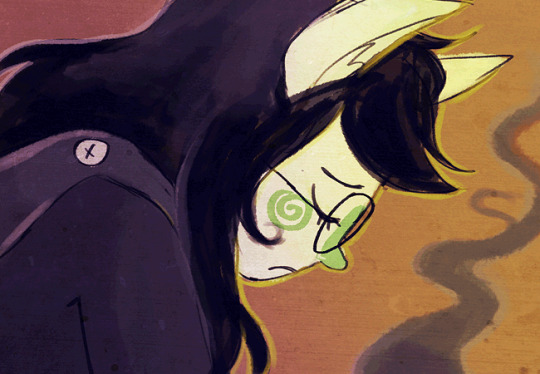
The other reason is the emotional journey that these classes go through. Sylphs and Witches must both travel through a point of extreme hopelessness --the dark night of the soul-- and are deeply affected by it, to the point that it changes their entire outlook. This in turn changes the trajectory of the story.
Setting
The Sylph/Witch lives in an untamed world that faces the possible annihilation of everything that they care about. Their world may be untamed wilderness with the Sylph/Witch encouraging the growth of civilization, or their world may be untamed because they chose the wild over civilization. But there is something threatening both the wild and the morals of the Sylph/Witch.
These classes live on the outskirts of other people’s lives. Centred and in tune with the world, but not with its people. When the horror first knocks upon their door, the Sylph/Witch may wonder if this has anything to do with them. They may believe more active classes will solve it with a little guidance, or that the problem isn’t such a big deal. However, only the Sylph/Witch has the power to protect their world from the oncoming threat. And only the Sylph/Witch has the wisdom to see the truth of the horror and accept it.
Internal Conflict
The Sylph/Witch must see that they still have value to the world. Even though all has been lost before the story even began, they must find their way back into the people’s hearts.
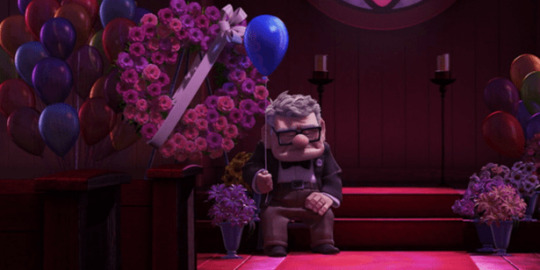
Once the Sylph/Witch embraces the world, they will see their own purpose and be able to keep moving forward.
External Conflict
The Sylph/Witch must face the forces of evil with the help of others. We will see that the horror is usually not a concrete antagonist, but a problem that appears to have no solution.
This horror is especially terrifying to the Sylph/Witch because it mirrors their deepest fears. Whether it is a nemesis long-past or a glimpse of their own future, the external conflict is something that the Sylph/Witch is convinced they cannot face. And it’s precisely because of this belief that this journey through the dark night of the soul will achieve the most amount of growth within them.
The Sylph
The Sylph answers their defining question with a shrug of the shoulders. “I have no purpose, and I intend to keep it that way.” Sylphs see themselves as outsiders, and merely an old fool, fetching the main characters and tagging along for the ride. They undervalue what they have to offer, and foist the responsibility onto other, more capable players.
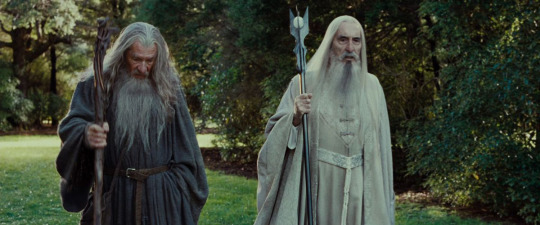
They can fall into the hermit archetype, as they wander around in the wilderness focused on their own goals, unwilling to connect with others.
Examples
The first example is Kanaya Maryam from Homestuck. She faces the extinction of her species because there is no longer a Matriorb. She stays on the periphery of relationship dramas, mediating instead of playing an active role.
The other example is Gandalf the Grey from The Fellowship of the Ring. Gandalf senses evil in the ring that Bilbo found and intuits it will bring great devastation. He sets the hero onto the journey, but steps out of it, focused on his own goals. He thinks he cannot offer anything to the heroes except by running around in the background, handling logistics and behind-the-scenes. But Gandalf must face his fears and learn to fight on the front-lines protecting those he cares about.
End Goal
The Sylph’s goal is to find their purpose and face the horror for the greater good of the world. Whether that means seeing with clear vision what it means for the horror to triumph and rallying their comrades, or stepping up themselves and filling a role they are unaccustomed to, the Sylph must face their dark night of the soul in order to save their world.
Kanaya uses the powers of a Rogue of Void to spawn another Matriorb. She guides Roxy to find it, seeing with clear vision that the mother grub must be recovered. She also puts aside her own fears around romance by starting one with Rose.
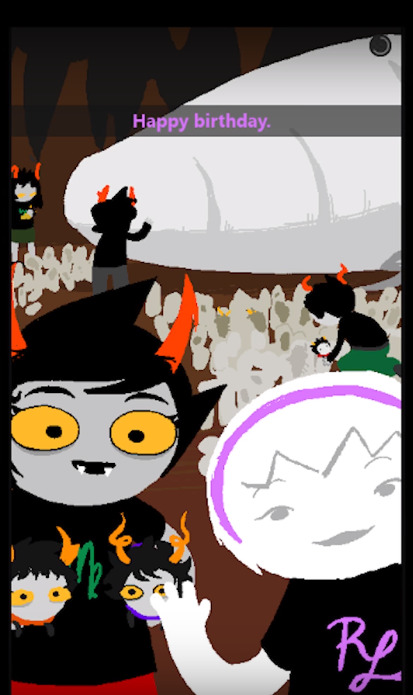
(You may also notice that Kanaya is the only Homestuck character that I talk about in the “end goal” section. And that’s because she’s the only one that completes her class’ character arc.)
Gandalf faces the Balrog of Moria alone in service of Frodo's journey to destroy The One Ring. He faces his fears and grows from the experience, maturing into Gandalf the White and facing the forces of evil head-on, with renewed confidence.
The Witch
The Witch answers the defining question by insisting that they already know their purpose. There is nothing to learn, nothing to protect. They live for themself alone.
They can fall into the sorceress archetype (as though “witch” wasn’t already an “evil archetype”!). They will connive and steal and manipulate to get everyone else out of their way.
Examples
Jade Harley from Homestuck is a prime example. She is playful by nature and doesn’t take the threat of either Jack Noir nor Lord English seriously. She uses her magic for her own entertainment and her forceful personality often prioritises her needs above those of others.
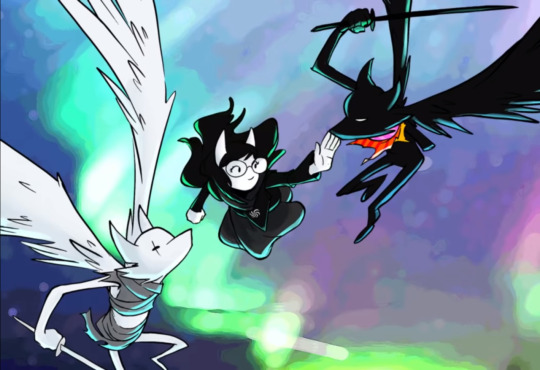
Carl Fredricksen from Up is another example. He chases the dreams of his late wife, leaving everything he knows behind. He wants to ignore all the problems and people he meets along the way, focusing only on the goals he made with Ellie.
End Goal
The end goal of the Witch is to find a purpose in service of others and to face their fears with honesty. Just like the Sylph, the Witch shies away from the horror because they are afraid, but they mask that fear with a preoccupation on the self.
Carl stands up to Charles to stop him from killing Kevin the Himalayan Monal Pheasant. He faces the fear of death whether in body or in legacy with bravery. He accepts Ellie’s death and the end of Charle’s (as well as his own) era of adventure. The horrors of death, loss, and end of eras are just a natural part of life, and Carl accepts them with grace. Then, he goes on to pursue further adventures with new people he cares about, adding them to the repertoire of people he loves, never replacing.
Conclusion
The Sylph/Witch may live in an untamed world. But through their actions, they can find meaning and relationships within it. By the end of their story, the world will no longer be untamed, and they will no longer reside on the outskirts. The Sylph/Maid has found a way into the heart of their world, and they intend to stay there. They will find their own value, and finally face the horror that threatens their world. Through facing this horror, they realise it is not pure horror, but a wonderful opportunity. An opportunity to not only accept what has passed, but also grow from it.
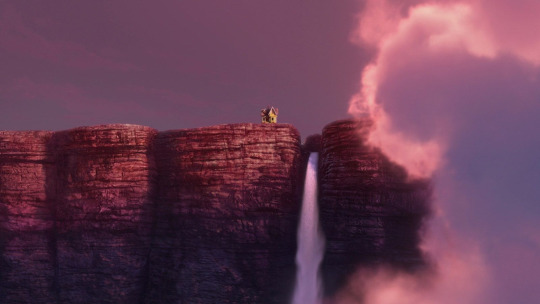
#classpect#sylph#witch#sylph of space#witch of space#homestuck#Kanaya Maryam#rose lalonde#Jade Harley#Jack Noir#Peregrine Mendicant#Lord of the Rings#The Fellowship of the Rings#Gandalf#Gandalf the Grey#Saruman#Up#story theory#analysis#my thoughts#Carl Fredricksen
38 notes
·
View notes
Text
Theory Time
So you guys know that I'm a bit crazy when it comes to @sariahgonzales626 's The Nutcracker and the Lost Magic, but over the course of looking at their amazing art, one thing stuck out to me?
How the hell did Matt get a monster form included with his already cursed nutcracker form?
For this, I had to review each drawing to make sure it was sorta to kinda accurate and here's what I came up with:
Matt probably had trauma when he was a child to adult and all of that trauma pented up to the fact where he's overprotective of Sara and doesn't want her to end up like him or just die like his parents did.
The monster form is triggered when Matt has a traumatic moment/memory or nightmare so maybe the mouse king gave him the monster form because he could sense the arrogance and trauma within his heart; either that or the mouse king wanted him to be more of a freak. Idk if it's true-
And that is my theory!
#nutcracker#the nutcracker#the nutcracker and the lost magic#matt drosselmeyer#sara stahlbaum#the mouse king#theory#story theory#((idk if its true
7 notes
·
View notes
Note
Wait- I'm super intrigued by your bio. "Story theory." What is this referencing? Is there a particular story theory??
ahh, my bio!
"Main fandoms: GW2, Middle-Earth, and reality. Fiction enthusiast and student of story theory. What is reality but the story of the Creator, the Author, the Word - Jesus Christ?"
Needs some updating, clearly - I've moved GW2 activity to a sideblog and I need to add Miraculous Ladybug. But your question is abt story theory! Thanks for asking! Let's dive in!
By story theory I primarily mean 'what is the art of storytelling, and telling stories well.' I mean the big things such as the study of character arcs, narrative themes (a quite extensive field on its own), plot structure, symbolism, truths and lies, the role of backstory and character motivation, major, side and background characters, narratively condemning or exalting various traits, qualities, actions, etc. etc. as well as, perhaps, the more basic concepts such as show-dont-tell, scene-and-sequel, narrative foils, etc.
What story theory is NOT is things like grammar, how to use punctuation, paragraphs, or quote marks, formatting chapters, and the like.
As far as I know there is no 'one particular' story theory, although I suppose different people have different answers to some of the questions (such as how many acts are in one story or how many basic types of stories there are).
I have learned most of my story theory from K.M. Weiland's blog, Helping Writers Become Authors, as well as the book Techniques of the Selling Writer by Dwight V. Swain.
As a side note, I particularly love seeing how fiction mirrors reality and I do greatly believe we are all living stories, that the world has its story, that History is God's Story, and so on. That's what makes fiction compelling - because we've lived it or seen it lived. God is the author(ity) of the universe and I think that's beautiful.
And I love analyzing it lol.
I can answer more specific questions as well if you like! I llve this subject! Thanks for asking!
4 notes
·
View notes
Text

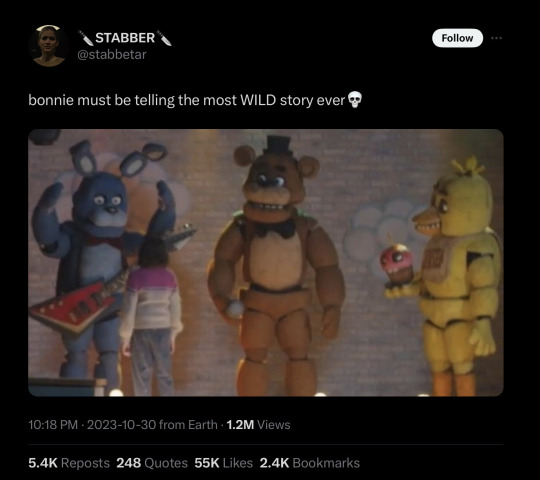
Bonnie tells the craziest stories in FNAF
#myart#chloesimagination#doodles#fnaf#fnaf fanart#fnaf movie#five nights at freddy's#mike schmidt#abby schmidt#vanessa fnaf#vanessa shelly#vanessa afton#fnaf bonnie#Bonnie being the most aggressive of the four is funny in theory#dudes so chill then snaps#only beat out by the cupcake on aggression#Abby loves his stories tho she thinks it’s cool BAHA
5K notes
·
View notes
Text
Just had a #theory ... A #JackAndtheBeanstalk THEORY!!!
#FairytaleTheory TIME!!!

#Theharp, what do you think She represents if you look at the story closely?
I didn't find much in googling, but... I have a theory...
The #giant= a difficult rich man with a beautiful daughter who falls in love with a poor farmer. He (the giant) forbids the relationship, the daughter runs off with the poor farm boy. The riches he and his mothers farm recieve rather then gold is representing how their love gives them a filling happy life. (As I recall in story they never leave the farm.) Thinking it through it made sense, in a way the home has new life brought into it, and in a way the farm flourishes through their hard work together.
2) A Mistress that flees with new traveling young man. Having either grown tired of the crouchy rich man, knowing he'd not leave his wife, has wandering gaze herself, or such... In a way Jack represents the passing through handsome visitor that gets the town buzzing.
It's also worth note in stories throughout history, often these stories with "passersby," are told that visitors in old were often referred to enter with intrigue and fanfare but leave by taking something from the people. Be met with such notoriety like with the giants wife first treats Jack with towards what some would treat visitors in smaller areas with not alot happening with.... Curiosity, Wonder even Flirtations, but often would take more then they came with so to speak when they left. There's numerous stories of this being a daughter, robbing people blind or both. Then there's where neither happens but often they face these exact confrontations (not counting in stories where the stranger leaves rather then stays I mean). It just was a similarity I never considered.
Its just something I never really thought about until using this as a reference in a later scene for STRY.
I paused, then realized, "Wait...! Hold Up here. I may be onto something!?" Sadly, google brought like no results no matter what I tried.
SO WHAT ARE YOUR THOUGHTS?
Interpretations?
Theories?
Any other fairytale theories?
I'd love to hear any others you may have too.
You can reblog with your own additions if you like. (Since commenting has a small word/character limit)
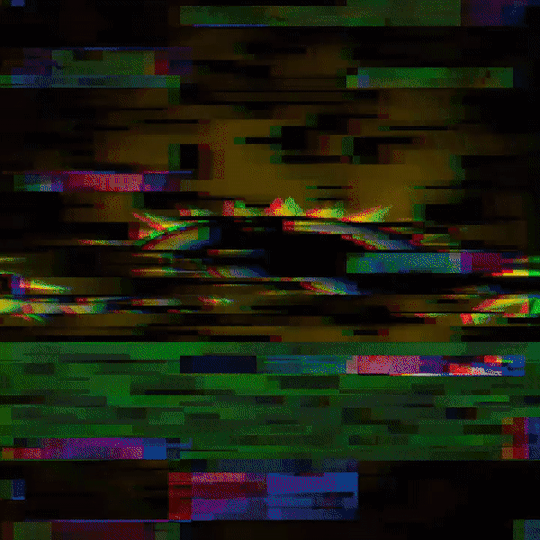
#never thought#fairy tales#fairytale#fairytales#jack and the beanstalk#jack & the Beanstalk#jack x harp#theory#story theory#Fairytale theory#fairy tale theory#fairy tale au#i was wondering#curious#thoughts#my thoughts#i wonder#what are your thoughts?#jack#jack Beanstalk#jack and the Beanstalk harp#harp#the harp#jacks harp#history#connotation#do you think#midnights#midnight thoughts#story thoughts
0 notes
Text

was lou supposed to say that????? (x)
#WHAT DO YOU MEAN IT WAS ORIGINALLY SUPPOSED TO BE EDDIE#911 abc#911#tommy kinard#lou ferrigno jr#eddie diaz#buck buckley#evan buckley#my theory is that tim had an idea for buck's relationship with natalia and/or lucy for s7#but then the actress who played natalia didn't want to or couldn't come back#and the actress who played lucy got cast in a different show#so then tim flipped the story so buck would have the queer arc and eddie would be the one in a relationship for the time being
2K notes
·
View notes
Text
"Kuina's death is ridiculous" yes! That's the point! You do realize that falling down the stairs is a way of showing Zoro how fragile human lives are, right? You are aware that the point of Kuina's character is the unfairness of the world towards women in comparison to the privileges men have, like living in itself and fulfilling their dreams, right? You know that Kuina's death is "ridiculous and dumb" because it's meant to show that even the strongest person Zoro knew could die from something so little, right? You understand that the value Zoro gives to life is fucking immense, right? Right?? You realize Zoro can't seek revenge because nobody took her away from him and now the only thing he can do is become the world's greatest swordsman to avenge her death, right? You get that Zoro's character is an atheist because he doesn't believe in anyone and he can only rely on himself when it comes to Kuina's sudden death, right? You are aware that sometimes people die in the simplest of ways and that doesn't make them weak because death doesn't discriminate, right? You know that all of these things are what make Zoro's character so interesting and important, right? Right??? You know, right?
Well, of course you fucking don't because if you knew you wouldn't be saying her death is ridiculous <3
#if i see somebody else complaining about this i am going to throw hands i swear to god#sorry i just saw a bad take in here and i couldn't stay quiet#it's the most basic thing about zoro's character why are people complaining#'his backstory is boring' well i think YOU are boring and also don't have good taste#i am a zoro defender for life and his backstory with kuina is amazing shutupshutup#stop trying to find a weird dark theory abt her death. you won't find anything. that's just it. she died.#she fell down the stairs and died and it's a great story let kuina rest in peace#one piece#roronoa zoro#shimotsuki kuina
2K notes
·
View notes
Note
CROWLEY SSR THOUGHTS
there is zero basis for this, but I can't get this thought of my head
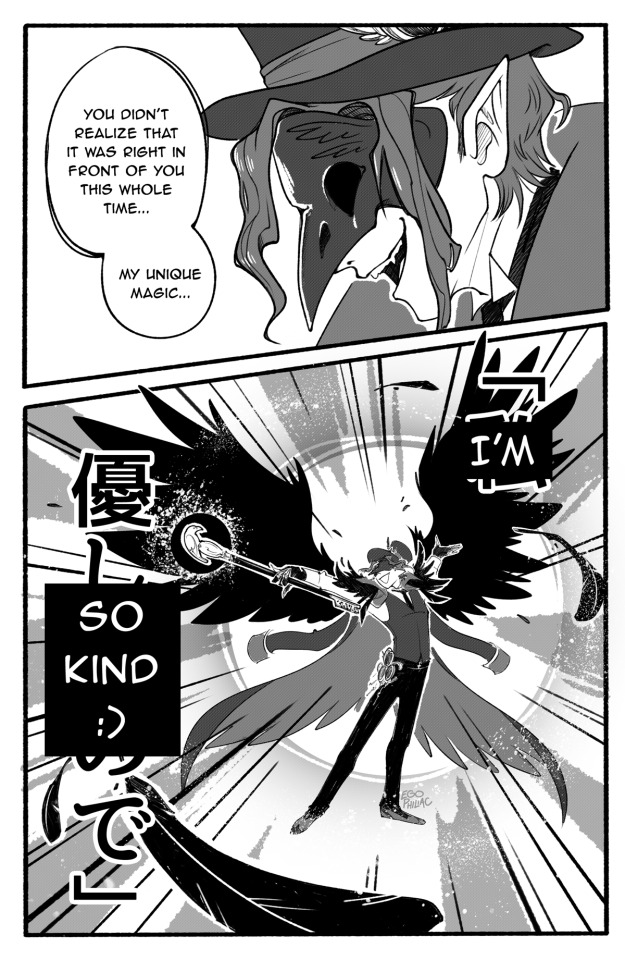
I don't know why I decided to draw it this way
#art#twisted wonderland#twisted wonderland spoilers#twisted wonderland episode 7 spoilers#twisted wonderland book 7 spoilers#(these will be relevant in a moment)#this isn't going to happen. but WHAT IF.#anyway i didn't get him (damnit birdman come home) so i had to look up his story#and let me tell you friends my findings were SHOCKING#crowley canonically likes vegetables which means that the crowley is revaan theory = BUSTED#crowley is sailor venus = CONFIRMED#(i know 'whip of love' is a saying but that's where my mind always goes)#DISCLAIMER: this is (mostly) a joke please continue to hold whatever theories and headcanons you want#but look. c'mon. look over here at this whiteboard i've covered in red yarn.#revaan being a picky eater has come up multiple times and there is an entire whole bit about how much he hated jerky and refused to eat it#and now they've made a point of talking about how crowley will eat almost anything and loOoOoves wild game meat especially#it's SO stupid but i can't help but read way too much into it#(this is tumblr if you don't want to see incredibly stupid overanalysis of anime guys then why are you HERE)#and i gotta hold on to something because otherwise whenever malleus and crowley are onscreen together i just keep going 'same hair color...#unless this is like. some kind of deep cover thing.#lilia doesn't recognize him because he saw him eat a green bean once and revaan would NEVER#crowley's secret is safe for another day#(serious hat on: i do think they're probably connected in some way)#(but there's something deeper going on that we're just not clued into yet that will hopefully explain things)#man forget revaan what if crowley whips off his mask and it turns out he was meleanor this whole time#wait hold on meleanor loves jerky. IT ALL FITS...
2K notes
·
View notes
Text

I click off immediately
#it's an immediate ick for me#like if you can't stick to the canon pronouns of a character I'm not gonna listen to your theory#it's such a surface level thing and it's actually important to the story that their gender isn't up to interpretation#if you can't grasp that then your theory is probably grasping at straws too#deltarune#kris deltarune#kris dreemurr
3K notes
·
View notes
Text
What are you writing? Queer joy and Queer rage in white spaces? And other PoC queer musings.
So basically I'm writing Queer rage for one novel, which covers a wide range of subjects besides queerness, such as most of the LGBTQIA things, and racism, ableism, disablism, etc. And what does it exactly mean to be a feminist while doing those things?
That novel, when I describe it gets zero push back. It's issues everyone knows, though I challenge pretty deep on some of the more messy bits that probably won't make straight people happy. Doing call outs and call ins along the way... but I'm sure white feminists will have deep issues with it or whatever.
The novel I have the most pushback on, so far, is the queer joy one. It's not a white setting, but white queers are upset at me on several ways I do it. I said something on the order of, Nuke the European gender binary in an other world planet and be delighted at making cis people question their gender identity, and the white queers were upset at me and then went onto tone policing.
The thread went to hell, when really, I was writing a culture that's approximately East Asian (I studied vastly well for this)? And the European binary shouldn't figure into it, and people got super upset at the idea I would do this? But it's not as if white straight people haven't nuked the gender binary before.
There's Ursula Le Guin and Neil Gaiman for example.
Iunno, I did the due diligence as a NB PoC, and did look at queer history of East Asian countries and pulled from that, which has more Third gender acceptance across the board, and if you look, it's less sanitized.
Japan constantly, constantly plays with gender in ways that make my NB self fall in love. Even the straight authors play around with X-Gender, etc. Watase Yuu also played with it where a character wanted to become female in one of their lesser known manga. I loved that manga, BTW, because probably before I knew, it covered a lot of the feels I had, and some of the weirdness of gender for me.
Have you read Blue Wars? I mean, Sooo good. And a Cis person wrote it.
Besides that, there is also Go Go Princess. Gender squishy bisexual (at least, if not pan) delight it is. The Beauty Inside (I liked the movie more than the drama, but both are good). And a ton of media where there are gender body swaps. (I love those). And I mildly like the cross dressing ones–though we need more men dressing up as women too in non-threatening ways. (which white people also take umbrage to–cishet people dressing up as the opposite sex, how dare you--it's anti-trans. But it's part of the folktales of the countries I cited.) But I like the magical ones better. And no one flags it and goes, you know what this needs, the pain of trans medical surge– and hormones, because that's trans-ness and you're really disrespecting trans people by not including it. But it isn't... often ironically and to my delight of anti-terfness, it's a challenge about what? Sexism. Ha! We got ya!
And after a while, sometimes I feel like the categorization of Nonbinary itself in this confined white definition feels, iunno, limiting. But I also feel like I'm not allowed to say that out loud or something. I'm betraying my NB status. After all, all of the guides about nonbinary-ness are written for a white straight audience in mind, saying things like NBs will really mind if you talk about their assigned birth sex and it's a betrayal to NB status to talk about their assigned sex. And maybe *psst* write about them having *gasp* sex with body parts and how dare you? Oh, but don't forget the NB PoCs out there. But do default to They, even if the NB community doesn't feel evenly about this... because you see, you really, really need the cis audience out there to know this character is NB. Even if there are people out there that use he/him/his and she/her/hers. Mind the cis audience, folks, you need to be consistent.
And I know I'm not all of NB-dom here, but I don't particularly feel this way. I delighted in Ranma 1/2 before I knew I was NB, though it kinda missed out on that gooey part of NBness for me, where you feel like neither or mixed. But I'm not allowed to do this, even if Ranma 1/2 is a romance of sorts...
I'm more like, whatever I could get tomorrow I'd take it, type. I love, love media that challenges cissexism and cisness. But my opinions aren't reflected in the white writing guides about NBs. You have to be super careful and not laissez faire. How dare you want to write NB romance where you talk about sex changes? Don't you know the dysphoria and how disrespectful it is to talk about NB bodies? duhn duhn duhn, you betrayed all of NBdom by giving fuel to the transphobes by talking about *gasp* their assigned sex. What will the straight people think?
But I don't feel that way. Maybe because the rigidity found inherent in European gender systems isn't in East Asia as much. I mean the super strict to the point that people lose their sense of morality type of gender correction. So I kind of feel like I'm floating in this liminal space of needing to bend to some white ideal of what queerness needs to be while lusting really hard to be given the freedom to express what I want to show it to be because my ideas of gender are "wrong" and "anti-queer" when I am queer and am trying to express my ideas of queerness and joy in being queer but being told my version of queerness isn't white enough, and thus anti-queer?
How does that work exactly?
So in order to reorder the gender system to automatically include NBs, I decided to nuke the entire gender system, which meant I had to also rework the sexual orientation section as well because it depends a lot on cis-ness to work in a European model, and thus kicks out NBs, which NBs then complain about. No one remembers that people felt "betrayed" when Elliot Page came out as Trans? I wanted to rework the system so there wasn't anything like that. I wanted a more inclusive system that celebrated trans-ness, NBness and Queerness without this reshuffling effect. And this also upset people. But I'm telling you with the strength of my degree, sexual orientation hasn't worked the same over time either, and me wanting to basically turn this thing around *in a story* and rework the sexual orientation system along with the gender system also gets people really upset.
Neil Gaiman got it. His angels don't have sex organs, so... how can you call them "gay" or "Bi" when their bodies are effectively androgynous?
But PoC NB questioning the shape of things and wanting to remake a world to accept more NBness by reshaping this, in *fiction* somehow is a threat?
So this is where I am at.
I did a hand wave in my fiction world and allowed characters to do consensual changing of their sex. 'cause East Asian fiction, presently and historically doesn't mind that much (though out of the public eye most of the time of international fans.) But I also didn't want to somehow "erase" the transness with it. I wanted to be honest that even if they change their physical sex, that there is still trans-ness inherent in it. And people don't really want to talk about how sometimes transitioning can change your sexuality and sexual orientation, but I wanted to talk about it in a way that wasn't all doom and gloom and about how horrible and how it betrays this sense of sexual orientation and identity to stay one sexual orientation all your life–because you must, or you betray all of queerdom. (What if the straights find out?) Fuck, do I have to think about straight people when writing queer joy? Apparently queer people want to remind you about the straights.
And then I have effectively the equivalent of bi, pan, omni, poly, lesbians, and gays running around in the world, which I suppose people will label the characters as anyway, even if I recategorized the sexual orientation boxes to neatly fit NBs. I wanted to allow for sexual orientation fluidity as well, which often the labels of bi, etc don't allow. 'cause I'm one of those really liberal queers that like talking about how some people have split attractions to different genders and some people are more attracted to one gender over another, which doesn't mean they hate that gender outright, which then the queer community feels iffy about, but I'm like, bring it on. Let's talk about people who are attracted to all genders who are only attracted to other people who are attracted to all genders. Is it wrong? No. Why should it be? It's not fetishization.
I also nuked a lot of the Victorian idealism over sex because in my research, such prudishness to that degree was a later imposition and I wanted to be sex positive (as an ace too) and also not quite historically accurate. 'cause sex positivity isn't automatically anti-ace or anti-queer, though some writing guides seem to make it out to be. And I didn't want to impose European imperialism on a world that effectively has no white people and has more trade cooperatives than imperialism (because there is a bigger threat usually than that). (No gulf stream... and the planet is warmer too, so no really white people, which people really got upset about. Eat it. You get your all white worlds somehow, with an equator and no Gulf Stream which makes no sense, then I get to have a PoC-dominate world with actual astronomy and geography behind it.)
Still Ace, but recognizing Sex workers as valid people and that regulation is better than none is totally something I do. I write frankly about sex too, 'cause ummm... Aces write about sex. Aceness is limited, conditional or no sexual attraction. And some Aces who are sex repulsed, also love to write smut. So... but I'm also told that's not the correct aceness by people who aren't ace?
Am I not allowed to write romance as an aromantic either? Even if I've actually experienced romance before? 'cause guess what? Aros also have romance too.
And yeah, I wrote some aces and aros in. 'cause I can.
But apparently I'm not doing it right. It's too neat, it's too messy, it's too PoC and not white queer enough. What about those Victorian values of never talking about body parts by their correct name in a fit of sex shaming and secrecy? Why can't I write that?
I didn't know Queer joy could be so, so decisive an issue. How dare you take away my label in a fictional world so you can include NBs in that world?
Wait until they see how I nuked the adoption system using historical cases... Ah, then they'll be really upset.
BTW, I'd 100% be down for a Lesbian or a Gay planet. Or a Pan paradise... (hopefully done better than Orville and Star Trek?)
#nonbinary#story theory#queer identity#queer community#queer identity in PoC spaces#diversity writing
11 notes
·
View notes
Text
The Role of the Sage in Kung Fu Panda
Thinking about the trinity in Kung Fu Panda.
Po, the young hero. His journey is two-fold: to find his own path, and to recognise his own worth.
Shifu, the mentor. His journey is to both love and care for those he trains, and to have enough objectivity to see them for who they are.
Oogway, the sage. His role is to guide the young people who will come after him, and once that job is done, leave the material world.
I think there's a reason why the "sage" role frequently dies in stories. Not just because it is a necessary catalyst for the heroes and the young mentors to rise to the occasion, but perhaps because that is their actual journey in the story.
It's difficult to let go. It's difficult to trust things that you've worked hard for to be carried on in the hands of others. It's difficult to see all that must be done and how to do it, but have the wisdom to leave this to others.
Every step of the way, Master Oogway has allowed Shifu to make his own blunders, and grow as a mentor. He allowed Shifu to send a messenger to Chorh-Gom Prison, knowing pretty well that this act would allow Tai Lung to escape. He allowed Shifu to train Po in his own way, even knowing the mental state Shifu was in and the unique needs of Po.
Although all these things seem pretty natural, for a less experienced sage, I'm sure it would have been difficult to do. I can see another version of Oogway, who perhaps is more anxious and less at peace, struggling with controlling Shifu and his students to make sure they were perfect (in fact, we see plenty of "sage" roles do so in other media, such as Grandma Wu from Turning Red and Abuela from Encanto).
(As an aside, we also see Master Oogway's failures. Although framed more as Shifu's failures, Master Oogway also failed Tai Lung. He should have stepped in to intercept Shifu's toxic way of training his son. He should have also provided more guidance for Tai Lung instead of turning away. Master Oogway has mastered the art of detachment, but he did not master the art of guiding others until the main events of Kung Fu Panda.)
While the growths of Po and Shifu were plain to see in Kung Fu Panda, it's also a treat to see Master Oogway complete the cycle of life completely in mastery of his role in life.
#kung fu panda#po ping#master oogway#master shifu#tai lung#archetypes#my thoughts#story theory#analysis#turning red#grandma wu#encanto#encanto abuela
56 notes
·
View notes
Text
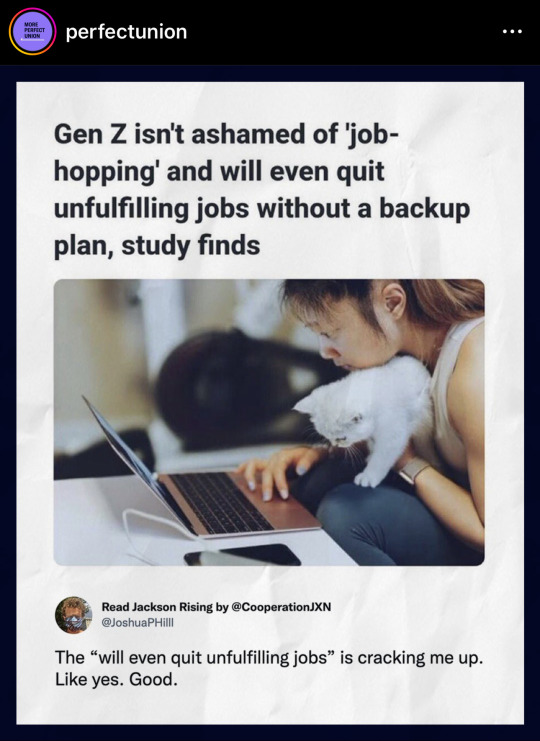
(Source: Instagram)
Gen Z…Have I mentioned lately how much I love you?
#generational theory is largely BS disclaimer#but when data tell us stories it’s sometimes worth noticing#generational theory
9K notes
·
View notes
Text
Storyline Study: Personal Story
Yesterday, I reblogged various threads of a post about what makes "war stories" so special, and now I'm going to derail into GW2.
Please note that this may be colored slightly by the fact that I main human + Vigil story. Feel free to read that into this analysis. (Also, playing as norn I think puts a slightly different spin on the PS, so this doesn't apply to them as much.)
The reason I, personally, am so attached to GW2 is because of the reasons we're fighting. Core/PS was introduced with "the dragons are horrific eldritch abominations, forces of nature we can't HOPE to stop, whose champions' defeats take the sacrifice of whole races." This is literally the synopsis on the back of Edge of Destiny. The price of fighting is huge, on a national level and a personal one, and everyone in the story consistently chooses to pay it anyway. What's interesting is why.
PS opens up with the player, young, untraveled, and naive, fighting in defense of the only home they's ever known - the city they's lived in all their life (or the Dream they haven't set foot outside of yet). They spends the next thirty levels traveling, fighting back the same threat they was faced with at level one, getting to know their racial mentor, and, eventually, learning about dragon minions.
I've talked before in a reblog (but apparently it got deleted, so here's the OP) about how the real reason the player is so famous is because they help people. In all the mundane ways, not just the big, war-related ones; they expresses care and concern for the civilians who suffer, in every map and throughout every map meta. They's done that from day one. They isn't famous because they fought the baddie in the tutorial; they was fighting alongside already well-established heroes, and at best the player is acknowledged only by association. No, the player is famous because they spread their care and kindness throughout the countryside afterward, becoming a hero in connection to their big heroic accomplishment at the tutorial only retroactively. (I mean, it's even in the name: renown hearts. Almost nowhere else in the game does it refer to our fame so blatantly.)
Throughout all eighty levels, the player continues to do this, showing their care and concern for the civilians, showing where their heart lies - with the people of the world who will suffer if someone doesn't step up to fight the dragons.
After the story establishes this solid motivation for the player, through focusing the story on aiding your country and becoming a valued advisor of your nation's top leadership, the player chooses an Order - chooses, in essence, that the way they can serve their country best is by fighting the dragons. That choice was generally understood to be a death sentence, because Elder Dragons were understood to be unstoppable forces of nature. But the player chose it anyway, because defending their country - their world - was important enough to try anyway, to go out fighting despite it being impossible.
I'm Vigil main, and I'm heavily Vigil-biased in all ways, but "some must fight so that all may be free" is a pretty good descriptor of the whole PS. Aside from being Almorra's personal motivation, and the motivation of the whole Vigil, it is also shown to be the motivator of the player, regardless of Order, by their behavior throughout the game.
The player chooses their Order but does not stop lending aid to anyone around who so much as looks like they need it; a passing traveler or merchant without a guard draws the player like a moth to a flame, and they pitches in to any regional or local battle they finds. This shows where their heart is, in the love and care and concern for the common people.
The player could've served their country or the world some other way, but they chose to fight dragons, because they saw dragons as most important. They saw dragons as more important than even their racial mentor did; this is the key that eventually brings Destiny's Edge together; "you have led, by word and by deed."
The player continues this even after being appointed Commander, and the story supports this by introducing the other primary character, Trahearne. Trahearne can be seen as symbolically representing the important qualities of the Commander, almost as a backup in case/when these qualities get edited out by players.
Trahearne also plays the role of a major supporting character, having similar goals and motivations; he has dedicated his life to cleansing Orr, because it used to be full of such life and what has happened to it is a tragedy - something to fix, and something to prevent from happening again. The devastation of Orr can be understood to symbolize the devastation to the people of Tyria if the dragons are allowed to win, and Trahearne's response to it as something that has already happened perfectly encapsulates the way the Commander reacts to it as something that cannot be allowed to happen in the future.
And the great and amazing thing is that everyone else in the story agrees. All the vast armies of unnamed soldiers - they have those same motivations and values. We know that because the Orders wouldn't exist otherwise. Nobody wants to fight such a losing battle unless they're bitter and/or seeking (futile) revenge. And those few are not the ones who are passionately leading the charge.
The leaders are the people like Almorra and Trahearne, who are fighting because the devastation and loss of life is so abhorrent to them, personally. The Pact is such a beautiful thing because everyone is united in a common goal, by a common motivation, because the dragons are honestly just that evil.
But most powerful of all is that we never expected to win. Cleansing Orr was supposed to be impossible. Killing Elder Dragons was assuredly impossible. Even trying to fight the dragons was just a defiant cry into the void, a declaration that we would not go down without a fight. Nobody expected to win, just to die, sure they'd done all they could.
And that refusal to do otherwise, the refusal to do other than hope, even amidst the destruction and lifelessness and horror of Orr, was motivated by our love for our homelands, for our people. And the player showed that by a lifestyle of helping wherever they could - by every renown heart and every event, multiple times per level, for eighty levels.
That's why I love the PS so much, I think. It's about hope in the face of the impossible, fighting on in the face of despair, because the world and life is worth fighting for, not because we ever expected to win.
And that's why actually cleansing Orr and defeating Zhaitan were such huge milestones, why everyone spent so much time marveling that we actually did it - because nobody was doing it in order to actually do it, but rather because they couldn't, in good conscience, do anything else, and it was worth it to give their lives to the cause.
The rest of the game post-Zhaitan does keep this theme of caring about the civilians, of course; but fighting the dragons now is just really difficult, not impossible and hopeless. Now there is a chance of survival, and you're fighting for a better future, and fighting isn't that hard anymore. You're not walking to certain death, you're fighting for a hope, emboldened because you know it really is possible.
After Zhaitan's defeat, there always remain hearts and events alongside the main story, because at heart the Commander is a kind and caring person who fights for the civilians, but the story itself is no longer about that concern, it's no longer about showing why the Commander cares or how dedicated the Commander is to the cause, but rather about the logistics of getting that done. It's about the Commander using their own force of inspiration, and the cause of fighting for home and country, to gather allies, proving it again and again, but in a sort of background way. The main focus of the story has moved on.
The story has moved on to questions such as is it even a good idea to be fighting dragons? The story has been, slowly, ever since S3 at the latest, having us question our decisions, making dragons out to be less and less "eldritch abominations" and more and more "corrupted/tormented by their own magic," with the ability to be spoken to and reasoned with, and even pitied. This idea runs counter to everything I've just talked about.
The ending of S4, where we speak to Kralkatorrik and we find out he's been controlled by his Torment this whole time and he's actually thoroughly miserable - it COMPLETELY destroys the whole point of Almorra's story and the way it related so beautifully to the rest of the game that made it compelling. And this is true of all of Core PS - to find out we were just wrong the whole time, completely ignorant, just misunderstanding the whole nature of the universe? That, by rights, we shouldn't have been trying to kill Zhaitan, but speak to him? It destroys all the moral and emotional credibility of the whole story. (I try to think about that as little as possible.)
Really, Core PS (and maybe up through HoT, perhaps) is a completely different story with a completely different message than S3 and onwards, and maybe that's why I've never really cared about the later parts of GW2 so much.
I've always preferred the PS because it is the most compelling part of the GW2 storyline. It was our first time. We had never won before. We were fighting clearly outlined Evil, personified as unstoppable forces of nature, and we could only win against them by such extreme acts of selfless Good as sacrificing our lives for strangers.
#gw2#guild wars 2#trahearne#almorra soulkeeper#vigil#s4#kralkatorrik#zhaitan#PS#core story#personal story#story theory#orr#hope#edge of destiny#impossible#s3#renown heart#event#level#tutorial#storyline study#storyline#personal storyline#commander poobah
21 notes
·
View notes
Text

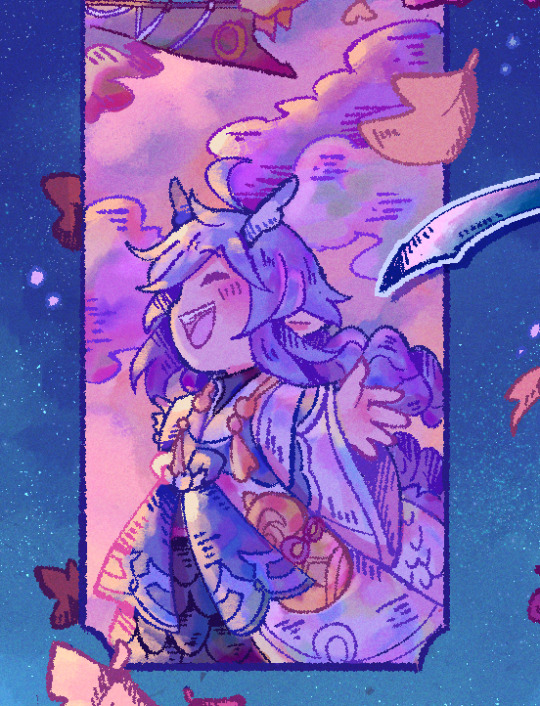
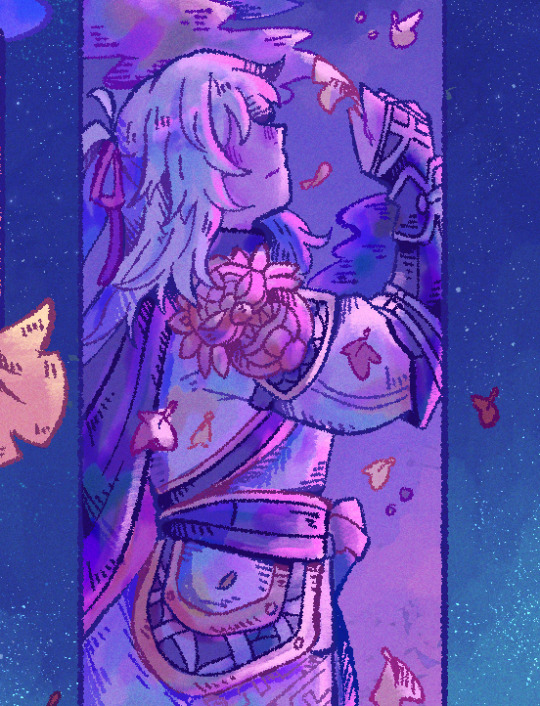
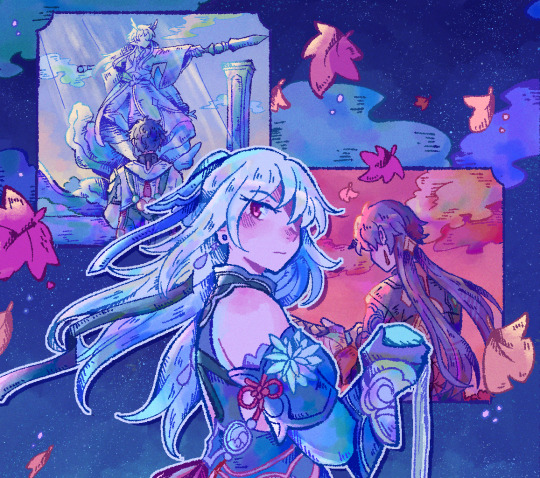
of five people, three must pay a price
#honkai star rail#hsr#dan heng#jing liu#jing yuan#bailu#blade hsr#high cloud quintet#hoyoverse#artists on tumblr#digital#“this update already passed though” time isn't real to me!!#perpetually slow artist syndrome strikes again!!!#anyway! jing liu's story quest genuinely had me shaking by the end of it i cannot believe the theories were right#also love that it released at the same time belobog's update did#march and stelle off doing sillies while dan heng over here having the worst afternoon imaginable
2K notes
·
View notes